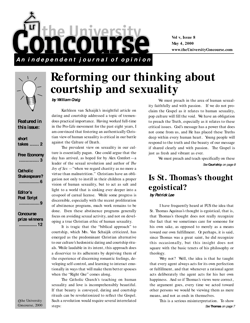Beware of economic Puritanism
by Kathleen van Schaijik
Thomas Storck has offered a convincing critique of capitalism from the point of view of Catholic social teaching, but I have a bone to pick with his distributist alternative. Perhaps I misunderstood, but it sounded like he was saying that no one should be allowed to become wealthy. “For if private property has a purpose and end… it surely is to allow a man to make a decent living for himself and his family by serving society. But one living, not two or three.” Philip Harold expressed something similar when he urged us to examine our economic consciences with questions like this: “Do we eat and drink for the sake of our bodily needs only, or with a view toward the maximum pleasure?”
Though I doubt either author thinks so, such statements and questions seem to suggest that there is something illicit in a Catholic’s having and enjoying wealth that greatly exceeds his material needs. But, not only is such an idea not to be found in the teachings of the Church; it is out of sync with the history of Catholic life and culture.
The Church shows a preferential love for the poor; she also warns us about the spiritual perils of material abundance; she exhorts us to give generously of our substance. But she never comes close to saying that there is something morally wrong or even compromising in being wealthy. If there were, there would be no such thing as a rich saint, while in fact there have been many.
Poverty-lived-virtuously gives witness to the next world; wealth-lived-virtuously reveals the beauty and plenitude of this one. Where we personally fall in the cosmic scheme of economic witnessing to God’s glory is a private question of circumstance and vocation. Am I called to sell everything I have and give it to the poor? Am I called to live moderately in the middle; or am I called to live leisurely and add to the material splendor of Catholic culture on earth? Only my conscience can say. Similarly only my conscience can settle for me particular questions of what to do with what wealth I have. And it seems to me the question to ask is not: “Do I need this [cell-phone, say, or beautiful painting]?” but “Is it good for me to buy it? Is this a right use of my money at this time in my life?” This is a question no one else can answer for me, since it depends so entirely on my own inward and outward circumstances, my sense of value, my myriad responsibilities, my unique make-up of strengths and weaknesses, my interior impression of God’s call in my life—what Newman calls my “illative sense.”
In the much-needed critique of consumerism and the system that engendered and sustains it, let’s take care not fall into a kind of economic Puritanism that equates abundance with extravagance and pleasure with self-indulgence.


